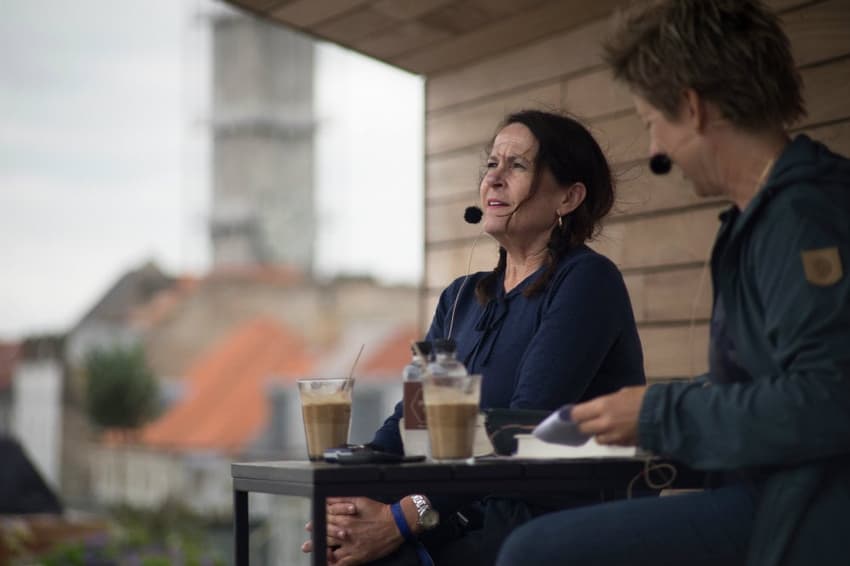Aarhus literature festival takes multilingual approach to programme

Internationals in Aarhus have a good chance of attending an event in their mother tongue at LiteratureXchange, a 10-day international literature festival taking place across the city.
Now in its second edition, Aarhus’ Danish and international literature festival LiteratureXchange is hoping to broaden its appeal to speakers of languages other than Danish, with 20 authors from across the globe appearing in multilingual events.
This year’s festival runs from June 13th-23rd at various cultural locations in the city, including cultural hub Godsbanen, the modern Dokk1 library, and several of the city’s churches.
The literature festival, arranged by Aarhus Municipality Libraries, Literature Centre Aarhus and adult education institute Folkeuniversitet Aarhus, was launched last year by organisers who wanted to bring an international literature event to Denmark’s second city.
Major international authors will appear at the 2019 event, including Peruvian-born Nobel Prize in Literature winner Mario Vargas Llosa as well as Siri Hustvedt, Jennifer Egan (both United States) and Nir Baram (Israel).

Nobel Prize in Literature winner Mario Vargas Llosa is headlining the Aarhus LiteratureXchange event. File photo: Stringer / Reuters / Ritzau Scanpix
“Last year, we found that there was huge interest in Aarhus in the international authors – even an unknown Ukrainian [Sergei Zhadan, ed.], whom up to 100 people came by to see. There were sold-out events which were only in German,” said Noa Kjærsgaard Hansen, Folkeuniversitet’s programme manager for the event.
“This year there will be almost 20 authors from all over the world, while we will also have an extended programme in Spanish and French,” Hansen added.
In addition to readings by authors, the festival will renew its Jorden Rundt (Around the Earth) concept, with a translator and an expert focusing on the literature of a specified geographic area before traditional food of the region is served in an open kitchen setting.
“It’s important for Aarhus’ cultural life to have events with a broad appeal. That’s why I’m pleased to see that LiteratureXchange has now established itself as a festival at which the Aarhus public is given the chance to take in a vast range of experiences, with authors from all over the world visiting the city,” Aarhus Municipality council advisor for culture Rabih Azad-Ahmad said via a press statement.
The full programme for the event can be found here.
READ ALSO: Fewer in Denmark reading books, despite publishing growth
Comments
See Also
Now in its second edition, Aarhus’ Danish and international literature festival LiteratureXchange is hoping to broaden its appeal to speakers of languages other than Danish, with 20 authors from across the globe appearing in multilingual events.
This year’s festival runs from June 13th-23rd at various cultural locations in the city, including cultural hub Godsbanen, the modern Dokk1 library, and several of the city’s churches.
The literature festival, arranged by Aarhus Municipality Libraries, Literature Centre Aarhus and adult education institute Folkeuniversitet Aarhus, was launched last year by organisers who wanted to bring an international literature event to Denmark’s second city.
Major international authors will appear at the 2019 event, including Peruvian-born Nobel Prize in Literature winner Mario Vargas Llosa as well as Siri Hustvedt, Jennifer Egan (both United States) and Nir Baram (Israel).

Nobel Prize in Literature winner Mario Vargas Llosa is headlining the Aarhus LiteratureXchange event. File photo: Stringer / Reuters / Ritzau Scanpix
“Last year, we found that there was huge interest in Aarhus in the international authors – even an unknown Ukrainian [Sergei Zhadan, ed.], whom up to 100 people came by to see. There were sold-out events which were only in German,” said Noa Kjærsgaard Hansen, Folkeuniversitet’s programme manager for the event.
“This year there will be almost 20 authors from all over the world, while we will also have an extended programme in Spanish and French,” Hansen added.
In addition to readings by authors, the festival will renew its Jorden Rundt (Around the Earth) concept, with a translator and an expert focusing on the literature of a specified geographic area before traditional food of the region is served in an open kitchen setting.
“It’s important for Aarhus’ cultural life to have events with a broad appeal. That’s why I’m pleased to see that LiteratureXchange has now established itself as a festival at which the Aarhus public is given the chance to take in a vast range of experiences, with authors from all over the world visiting the city,” Aarhus Municipality council advisor for culture Rabih Azad-Ahmad said via a press statement.
The full programme for the event can be found here.
READ ALSO: Fewer in Denmark reading books, despite publishing growth
Join the conversation in our comments section below. Share your own views and experience and if you have a question or suggestion for our journalists then email us at [email protected].
Please keep comments civil, constructive and on topic – and make sure to read our terms of use before getting involved.
Please log in here to leave a comment.